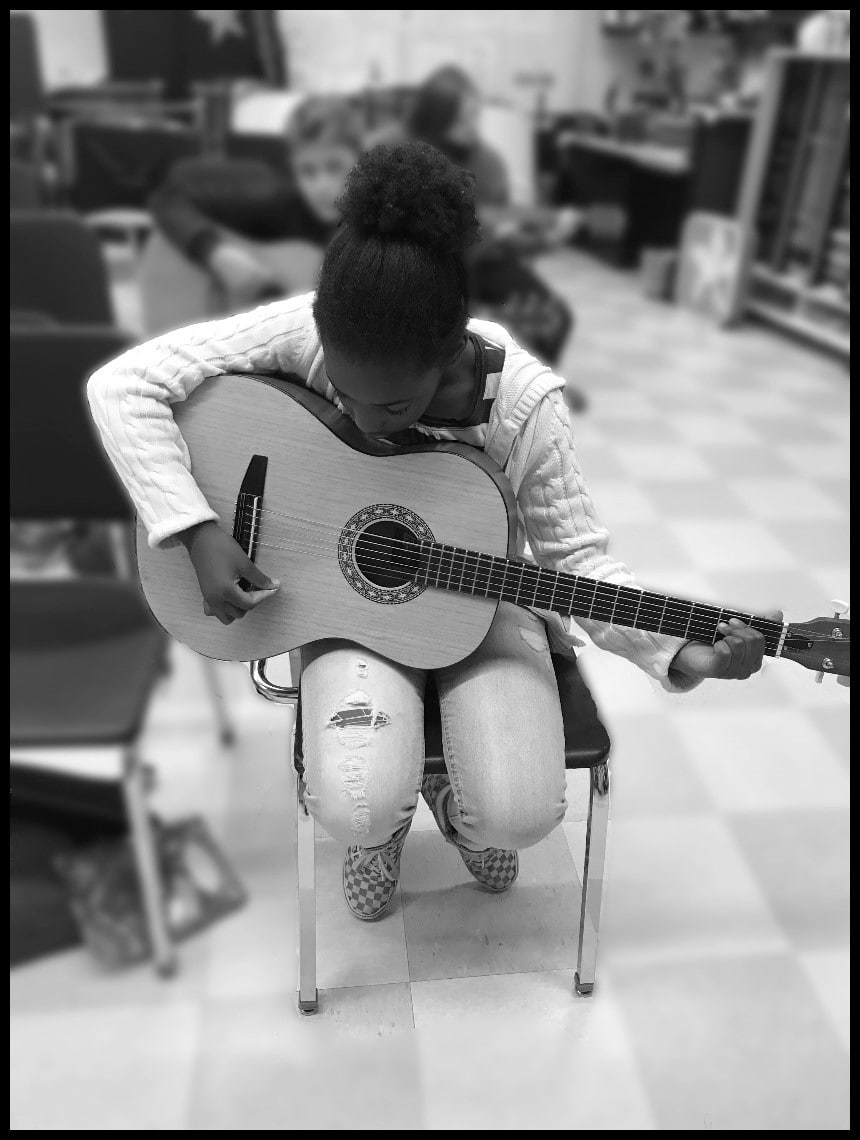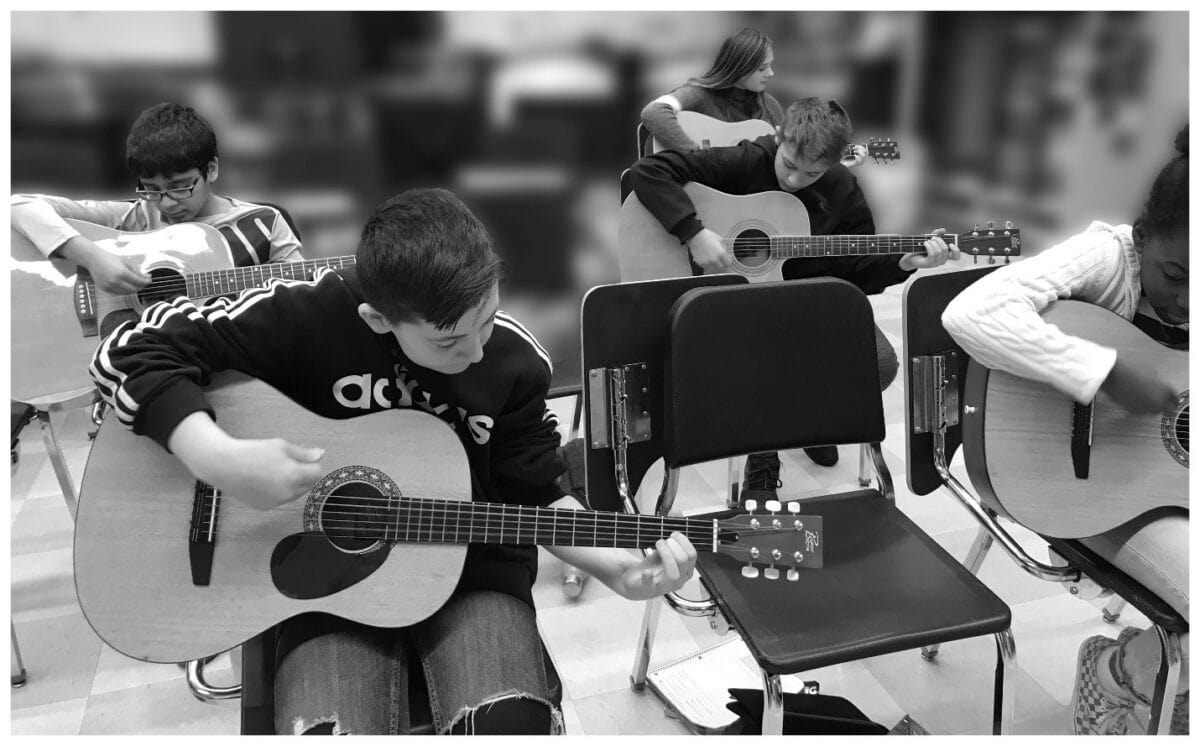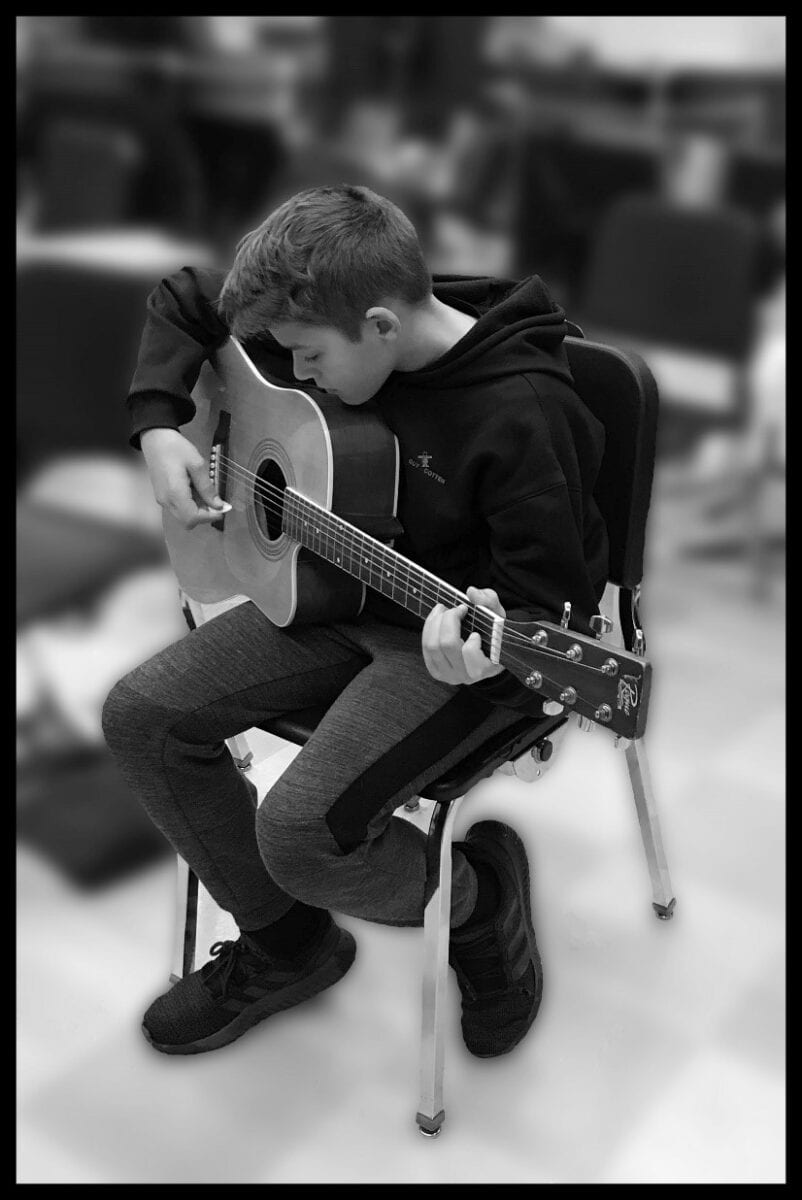/ News Posts / Guitar Class in the Pine Tree State
Guitar Class in the Pine Tree State
Number 45: The State of Maine
By Thomas Amoriello Jr.
NAfME Council for Guitar Education Chair
In this edition of “50 States of Guitar Class,” the NAfME Council for Guitar Education visits Gorham Middle School in Gorham, Maine, where Tracy Wheeler Williamson, who is a general music teacher, choral director, and steel band director, leads a guitar program. Before coming to Gorham Middle School in 2003, she taught elementary general music, beginning band, and 3rd–5th grade chorus in Lisbon Falls, Maine. Williamson has managed the Maine Music Educators Association (MMEA) District 1 Honors Choirs; is the manager and host of the Maine American Choral Directors Association (ACDA) Youth and Children’s Honor Choir Festival; and was the 2019 Guest Conductor for the MMEA District 2 Elementary School Honors Choir.
Williamson holds a Bachelor of Music in Flute Performance from Boston University and a Master of Music in Music Education and Flute Performance from Boston Conservatory. In addition to teaching, she also is webmaster for the Pan New England website and the MMEA District 1 website. Williamson is an Apple certified-teacher and certified Soundtrap educator with a passion for enhancing music education through technology integration. She occasionally writes and performs music with her singer/songwriter/guitarist and 7th Grade ELA teacher husband, Ben Williamson. Williamson is a native of West Greenwich, Rhode Island, and currently resides in Bridgton, Maine, with her husband, Ben, and their two dogs: Sushi the Puggle and Junebug the Scruffy Mix. When not planning for school, Williamson loves to cook and swim, and you just might see her snowboarding out on the hill at Shawnee Peak in the winter.
The NAfME Council for Guitar Education would like to thank Williamson for sharing her knowledge with the NAfME membership.
Please tell us about your school and overall music program.
Gorham Middle School is a public school for grades 6 through 8 in the Greater Portland area in Gorham, Maine. There are about 670 students across the three grade levels. All 6th and 7th graders take General Music Class and students in all grades are offered the opportunity to participate in band, chorus, and steel band classes as well.
Please tell us about your own personal musical background growing up and your collegiate experience.
I attended elementary and middle school in Exeter-West Greenwich, Rhode Island, and had a super fun, dynamic, unique music class experience. Our music teacher was very well loved, and anyone who had the pleasure of being in his classes still considers him one of the best teachers they’ve ever had. He played guitar, sang silly songs, and inspired us with all sorts of music from Sondheim to Beethoven, Enya and Peter Gabriel. I joined the band in 4th grade and chose the flute. I started private lessons right away, and throughout high school I participated in every school ensemble, All-State, All-New England, All-Eastern festival, music camp, and performing experience I could find.
I earned my Bachelor of Music in Woodwind Performance at Boston University (BU) where I majored in flute. It was at BU that I had my first experience with guitar playing in a beginner level class. I went on to earn my Master of Music in Flute Performance and Education from Boston Conservatory and moved to Maine shortly after that. I finished up my certification requirements through the University of Southern Maine and got my first teaching position in Elementary General Music and Beginning Band. After two years I applied and was offered my current position at Gorham Middle School.
“Several years ago I ran into a former student at a basketball game, and she gave me a huge hug and told me how much I had inspired her singer/songwriting career when she learned to play guitar in 6th grade music class. She now tours around the country playing guitar and singing her original music.”
How do the guitar family of instruments fit into your teaching?
In my first teaching position, I was traveling from room to room on a cart, so accompanying elementary student singing on guitar quickly became vital to my practice. When I moved to my current position at Gorham Middle School, I spent two years teaching recorder before I created the guitar program for 6th grade general music in 2005. I felt that guitar playing was going to be much more relevant and interesting to middle school students. We started with ten guitars, and we currently have about 25 guitars.
“Whenever a student tells me that they have gotten a guitar for their birthday or for Christmas, or a parent sends me an email asking for guitar teacher recommendations, I know that I have inspired them to continue playing!”
What obstacles did you face when you were first hired at your school? Now?
When I was hired, there was a shift in school configurations, and the middle school building was brand new to the district. There was no music program for middle school, so I created it from scratch. It was a fun challenge, and I was very thankful to have a budget to purchase new instruments and equipment. Over the years the biggest obstacle has been scheduling. While I feel fortunate to be offered a good amount of time within our school day for music, I always feel like it’s something I cannot take for granted and I am constantly advocating for.
What kind of classes related to the guitar do you teach?
All 6th grade students are offered the choice of guitar or keyboard in general music class. We spend some time exploring both, and then they choose which one they’d like to continue learning. Rather than follow a method book, I have chosen recognizable songs from the ’70s and ’90s with chords that students can easily learn to practice switching fingers and plucking fun riffs and basslines. We also incorporate apps like Soundtrap with our guitar and keyboard playing for recording assessments and songwriting.
What would you say to the non-guitarist music educator who is about to or interested in incorporating the guitar into their program?
Learn the instrument well enough to be a good model for your students and choose fun music that is relevant. Every class will be different! Know your students, their limitations, and interests to help inspire them to have fun and love playing!
Do you have any success stories you would like to share about students (musical and non-musical)?
We have very limited time to work with students in 6th grade general music class. The class lasts for nine weeks, and we spend about five of those weeks on guitar playing. Whenever a student tells me that they have gotten a guitar for their birthday or for Christmas, or a parent sends me an email asking for guitar teacher recommendations, I know that I have inspired them to continue playing! Several years ago, I ran into a former student at a basketball game, and she gave me a huge hug and told me how much I had inspired her singer/songwriting career when she learned to play guitar in 6th grade music class. She now tours around the country playing guitar and singing her original music.
What do you tell your talented students who are planning to pursue music or guitar studies in high school or college after they finish with you?
I am constantly reminding students that it takes lots of practice before you can be a rock star! Students crave instant gratification and can get easily frustrated when their instrument doesn’t make the perfect sound or they can’t get a riff on the first try. I try to encourage them to keep working and eventually it will get easier.
Do you have any networking or advocacy tools that have worked for you promoting your program that would help other educators?
Twitter has been an amazing resource to connect with educators all over the world. And, of course, attending conferences is invaluable for networking and learning what other educators are doing in their classrooms. I haven’t had the opportunity to attend a national NAfME conference yet, but I regularly attend the Maine Music Educators Association annual conference and NAfME Eastern Division conferences.
What kind of future do you see for guitar in music education in Maine schools?
As our Maine music education programs evolve to offer more varied, non-traditional programming to inspire students, I think guitar will continue to flourish in our schools. There are quite a few Maine music educators incorporating guitar into their curriculum now. The Maine Acoustic Festival began several years ago and offers middle and high school guitarists and folk musicians a festival experience like we offer to our traditional band, choral, and orchestral students. I am excited to see guitar ensembles, ukulele ensembles, rock bands, electronic music, and world instruments being incorporated as alternatives to traditional programming in public music education curriculum.
What type of lesson plans have you done for your classes that may be unique?
We don’t follow a method book for guitar class. Instead we learn through a variety of songs. We study the lyrics, the history, and the musicians; then we learn the chords for the song. I try to stick with songs that have no more than three chord changes. Then we learn any riffs that might be in the song. Sometimes I need to create a simplified version of the riff and bassline to help students be successful.
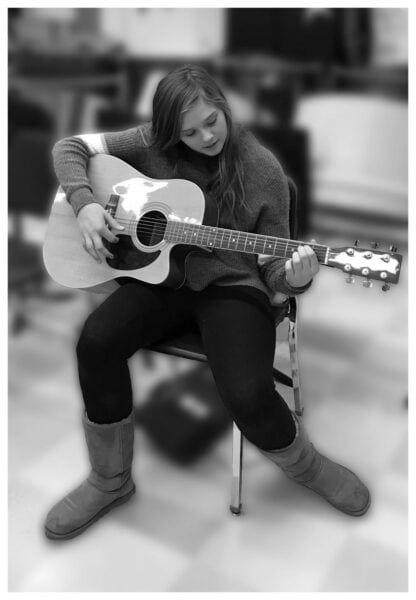
Photo courtesy of Tracy Wheeler Williamson
When we play the song as a class, students have a choice of playing the chords, the riff, or bassline depending on what they are most comfortable playing. Some of the songs we have learned in the past are “Horse with No Name” by America, “Seven Nation Army” and “I Can Tell That We Are Gonna Be Friends” by the White Stripes, “Smoke on the Water” by Deep Purple, and “Sweet Home Alabama” by Lynyrd Skynyrd. We end the music class rotation by studying early blues, and the students collaborate to write and record a blues song using Soundtrap.
Do you participate in any musical performances or activities outside of your public school teaching duties?
I wish I had more time! I used to play flute and piccolo in orchestras before I moved to western Maine and away from Portland where most of the performance opportunities are. I played in the pit for Into the Woods for our local community theater a couple of summers ago, and I sometimes accompany the students in our district choral festivals when a piece has a flute part. We have a lot of instruments at home, so occasionally my husband and I might sing and play guitar, bass, or drums, but that’s usually during the summer break when I haven’t spent the entire day teaching it!
Any last thoughts to conclude our interview?
As music educators we need to remember to stay fresh, varied, and new. It’s easy to get stuck in tradition and routine, get bogged down by standards and assessments, or be afraid to go out on a limb and try something new. If you’re not having fun, switch it up! Try something different! We are so lucky to teach a subject that is inherently creative and collaborative. Keep inspiring your students to love and want to continue making music!
Past “Guitar Class in 50 States” articles:
- Number 50: The Granite State (New Hampshire)
- Number 49: The Green Mountain State (Vermont)
- Number 48: The Mountain State (West Virginia)
- Number 47: The Hoosier State (Indiana)
- Number 46: The Mount Rushmore State (South Dakota)
- Number 44: The Badger State (Wisconsin)
- Number 43: The Constitution State (Connecticut)
- Number 42: The Evergreen State (Washington)
- Number 41: The Pelican State (Louisiana)
- Number 40: The Beaver State (Oregon)
- Number 39: The Equality State (Wyoming)
- Number 38: The Empire State (New York)
- Number 37: The Old Line State (Maryland)
- Number 36: The Centennial State (Colorado)
- Number 35: The Bay State (Massachusetts)
- Number 34: The Sooner State (Oklahoma)
- Number 33: The Prairie State (Illinois)
- Number 32: The Hawkeye State (Iowa)
- Number 31: The Volunteer State (Tennessee)
- Number 30: The Palmetto State (South Carolina)
- Number 29: The Natural State (Arkansas)
- Number 28: The Tar Heel State (North Carolina)
- Number 27: The Magnolia State (Mississippi)
- Number 26: The Peace Garden State (North Dakota)
- Number 25: The Treasure State (Montana)
- Number 24: The First State (Delaware)
- Number 23: The Buckeye State (Ohio)
- Number 22: The Yellowhammer State (Alabama)
- Number 21: The Sunflower State (Kansas)
- Number 20: The Great Lakes State (Michigan)
- Number 19: The Lone Star State (Texas)
- Number 18: The Bluegrass State (Kentucky)
- Number 17: The Golden State (California)
- Number 16: The Show-Me State (Missouri)
- Number 15: The Keystone State (Pennsylvania)
- Number 14: The Last Frontier State (Alaska)
- Number 13: The Beehive State (Utah)
- Number 12: The Peach State (Georgia)
- Number 11: The Cornhusker State (Nebraska)
- Number 10: The Gem State (Idaho)
- Number 9: The Old Dominion (Virginia)
- Number 8: The Aloha State (Hawaii)
- Number 7: The Land of Enchantment (New Mexico)
- Number 6: The Sunshine State (Florida)
- Number 5: The Grand Canyon State (Arizona)
- Number 4: The Ocean State (Rhode Island)
- Number 3: The North Star State (Minnesota)
- Number 2: The Silver State (Nevada)
- Number 1: The Garden State (New Jersey)
About the author:
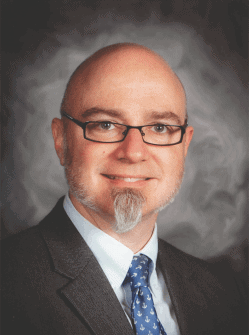 Thomas Amoriello Jr. serves as the chair on the NAfME Council for Guitar Education and is also the former Chairperson for the New Jersey Music Education Association. Tom has taught guitar classes for the Flemington Raritan School District in Flemington, New Jersey, since 2005 and was also an adjunct guitar instructor at Cumberland County College, New Jersey, for five years. He has earned a Master of Music Degree in Classical Guitar Performance from Shenandoah Conservatory and a Bachelor of Arts in Music from Rowan University. He is the author of the children’s picture books A Journey to Guitarland with Maestro Armadillo and Ukulele Sam Strums in the Sand, both available from Black Rose Writing. He recently made a heavy metal recording with a stellar roster of musicians including former members of Black Sabbath, Whitesnake, Ozzy Osbourne, Yngwie J. Malmsteen’s Rising Force, and Dio that was released on H42 Records of Hamburg, Germany. The record released on 12-inch vinyl and digital platforms has received favorable reviews in many European rock magazines and appeared on the 2018 Top 15 Metal Albums list by Los Angeles KNAC Radio (Contributor Dr. Metal). Visit thomasamoriello.com for more information.
Thomas Amoriello Jr. serves as the chair on the NAfME Council for Guitar Education and is also the former Chairperson for the New Jersey Music Education Association. Tom has taught guitar classes for the Flemington Raritan School District in Flemington, New Jersey, since 2005 and was also an adjunct guitar instructor at Cumberland County College, New Jersey, for five years. He has earned a Master of Music Degree in Classical Guitar Performance from Shenandoah Conservatory and a Bachelor of Arts in Music from Rowan University. He is the author of the children’s picture books A Journey to Guitarland with Maestro Armadillo and Ukulele Sam Strums in the Sand, both available from Black Rose Writing. He recently made a heavy metal recording with a stellar roster of musicians including former members of Black Sabbath, Whitesnake, Ozzy Osbourne, Yngwie J. Malmsteen’s Rising Force, and Dio that was released on H42 Records of Hamburg, Germany. The record released on 12-inch vinyl and digital platforms has received favorable reviews in many European rock magazines and appeared on the 2018 Top 15 Metal Albums list by Los Angeles KNAC Radio (Contributor Dr. Metal). Visit thomasamoriello.com for more information.
Interested in reprinting this article? Please review the reprint guidelines.
The National Association for Music Education (NAfME) provides a number of forums for the sharing of information and opinion, including blogs and postings on our website, articles and columns in our magazines and journals, and postings to our Amplify member portal. Unless specifically noted, the views expressed in these media do not necessarily represent the policy or views of the Association, its officers, or its employees.
Catherina Hurlburt, Marketing Communications Manager. March 12, 2020. © National Association for Music Education (NAfME.org)
Published Date
March 12, 2020
Category
- Ensembles
Copyright
March 12, 2020. © National Association for Music Education (NAfME.org)
